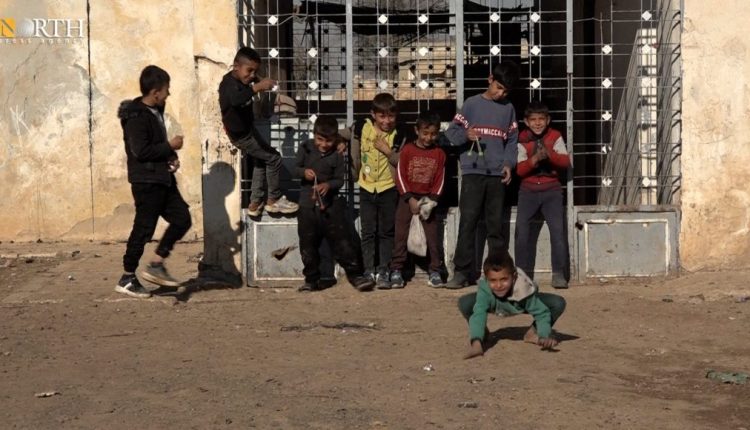
By Fattah Issa
KOBANI, Syria (North Press) – Hishan expresses her frustration about the lack of stability and security, which in turn deprived students of their right to education. When Turkish airstrikes targeted northeastern Syria, schools were closed for over a week, negatively impacting the educational process.
Hishan Ahmad, 32, a mother of three children in the village of Kazkan in the eastern countryside of Kobani, northern Syria, said that schools were closed for a week due to Turkish airstrikes on Northeast Syria, including Kobani and its countryside.
The mother recalls that schools were also closed for a week in November 2022 due to Turkish airstrikes, depriving students of their right to continue their education in a safe environment.
In the past academic year of 2022, Turkish shells targeted the city of Kobani and the village of Qaramogh, leading to the suspension of schools for a week.
Ahmad calls on the guarantor countries, the U.S. and Russia, to intervene and stop Turkey from bombing the area, which in turn deprives students of their education.
Since 2019, Turkish attacks on the city of Kobani and its countryside have led to closure of schools and the disruption of the educational process several times during each academic year. This ultimately deprived students of their right to education in a safe and stable environment, especially in villages near the border.
The Education Board of the Autonomous Administration of North and East Syria (AANES) said in a statement on Dec. 28, 2023, in the city of Raqqa, northern Syria, that Turkish airstrikes halted the educational process in more than 712 schools, depriving 89,418 students of education.
Turkish attacks on northeastern Syria negatively impact the educational process, as students are reluctant to attend schools due to fear of attacks. This has been evident in the number of students attending the 2023-2024 academic year in most schools, according to officials in the Education Board.
Fawaz Isso, 40, like other residents in villages near the border in the eastern and western countryside of Kobani, told North Press he hears the sound of Turkish shells the moment they are launched and when they hit their target, raising concerns among the residents of those villages, especially the children.
Isso, a father of two children who study in one of the border villages in the eastern countryside of Kobani, believes that villages near the border are the most affected in terms of education as a result of Turkish attacks against the region.
Isso noted that schools were closed three times during the past academic year due to Turkish airstrikes. Meanwhile, he called to compensate the students for the lessons they missed.
When Turkish forces start launching airstrikes, Sherin rushes to the school to bring her three children home. She told North Press she fears that schools might be attacked and she loses her children. She has concerns they might not have an academic future as they lack a safe environment to learn.
Sherin Abdi, 40, resides in the village of Alishar in the eastern countryside of Kobani. As they live near the border, she and her children grow more fearful whenever Turkish forces target the region and intentionally destroy infrastructure facilities.
Abdi calls on guarantor states to intervene to prevent Turkish airstrikes, so students can continue their education and take the lessons they missed when schools were closed.
Bakr Jerada, co-chair of the Education Board of the AANES in Kobani, said that Turkey targets the infrastructure in the region, as well as its security and stability.
Jerada added that during the past academic year, the region was targeted several times, depriving thousands of students of education. He pointed out that a school in the village of Koran in the east of Kobani was completely destroyed. Additionally, residents of villages in the west of Kobani, including Zorava, Siftik, and Ziyara all the way on the border to the city of Jarablus, suffer from daily Turkish bombardment.
Jerada told North Press that villagers fear for the safety of their children and they themselves are afraid to go to school, which negatively impacts education.
The recent Turkish airstrikes, which targeted the infrastructure in several cities in northeastern Syria, prompted the Education Board to suspend schools, especially in Kobani. The educational process was suspended in 590 schools, depriving 68,439 students of education, according to Jerada.
The official attributes the temporary closure of schools to indiscriminate Turkish attacks targeting various sites, which result in an educational deficit.
Jerada stressed that the Board will attempt to compensate students by extending attendance at the end of the academic year. In 2022, school attendance was extended for 15 days due to Turkish attacks and the earthquake that hit Syria and Turkey in February 2023.
Jerada holds organizations and institutions that advocate for children’s and students’ rights to adhere to international agreements related to the right to education, urging them to take action about Turkish violations and to take a firm stance.
